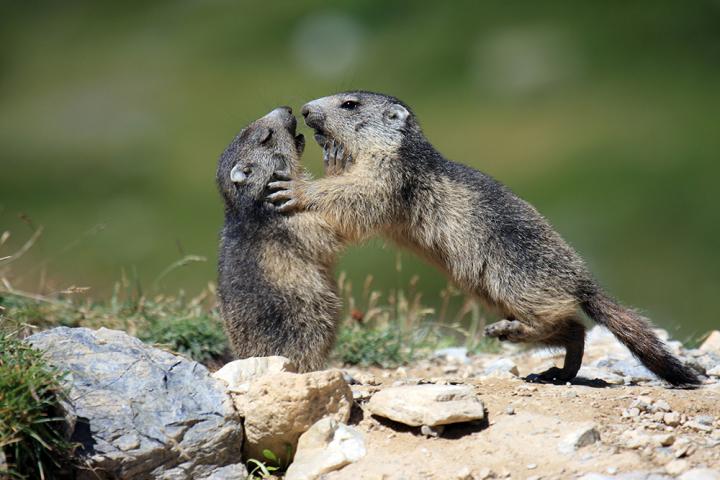An analysis of the alpine marmot’s genome

Credit: Carole and Denis Favre-Bonvin
What effects does climate change have on the genetic diversity of living organisms? In a study led by Charité – Universitätsmedizin Berlin, an international team of researchers studied the genome of the alpine marmot, an ice-age remnant that now lives in large numbers in the high altitude Alpine meadow. Results were unexpected: the species was found to be the least genetically diverse of any wild mammal studied to date. An explanation was found in the marmots genetic past. The alpine marmot has lost its genetic diversity during ice-age related climate events and been unable to recover its diversity since. Results from this study have been published in the journal Current Biology*.
A large rodent from the squirrel family, the alpine marmot
lives in the high-altitude mountainous terrain found beyond the tree line. An international team of researchers has now successfully deciphered the animal’s genome and found the individual animals tested to be genetically very similar. In fact, the animal’s genetic diversity is lower than that of any other wild mammal whose genome has been genetically sequenced. “We were very surprised by this finding. Low genetic diversity is primarily found among highly endangered species such as, for instance, the mountain gorilla. Population numbers for the alpine marmot, however, are in the hundreds of thousands, which is why the species is not considered to be at risk,” explains Prof. Dr. Markus Ralser, the Director of Charité’s Institute of Biochemistry and the investigator with overall responsibility for the study, which was co-led by the Francis Crick Institute.
As the alpine marmot’s low genetic diversity could not be explained by the animal’s current living and breeding habits, the researchers used computer-based analysis to reconstruct the marmot’s genetic past. After combining the results of comprehensive genetic analyses with data from fossil records, the researchers came to the conclusion that the alpine marmot lost its genetic diversity as a result of multiple climate-related adaptations during the last ice age. One of these adaptations occurred during the animal’s colonization of the Pleistocene steppe at the beginning of the last ice age (between 110,000 and 115,000 years ago). A second occurred when the Pleistocene steppe disappeared again towards the end of the ice age (between 10,000 and 15,000 years ago). Since then, marmots have inhabited the high-altitude grasslands of the Alps, where temperatures are similar to those of the Pleistocene steppe habitat. The researchers found evidence to suggest that the marmot’s adaptation to the colder temperatures of the Pleistocene steppe resulted in longer generation time and a decrease in the rate of genetic mutations. These developments meant that the animals were unable to effectively regenerate their genetic diversity. Overall results suggest that the rate of genome evolution is exceptionally low in alpine marmots.
Commenting on the significance of their results, Prof. Ralser says: “Our study shows that climate change can have extremely long-term effects on the genetic diversity of a species. This had not previously been shown in such clear detail. When a species displays very little genetic diversity, this can be due to climate events which occurred many thousands of years ago,” He adds: “It is remarkable that the alpine marmot managed to survive for thousands of years despite its low genetic diversity.” After all, a lack of genetic variation can mean a reduced ability to adapt to change, rendering the affected species more susceptible to both diseases and altered environmental conditions – including changes in the local climate.”
Summarizing the study’s findings, Prof. Ralser explains: “We should take the results of the study seriously, as we can see similar warnings from the past. In the 19th century, the passenger pigeon was one of the most abundant species of land birds in the Northern Hemisphere, yet, it was completely wiped out within just a few years. It is possible that low genetic diversity played a role in this.” Outlining his plans for further research, he adds: “An important next step would be to study other animals more closely which, like the alpine marmot, managed to survive the ice age. These animals might be trapped in a similar state of low genetic diversity. Currently, estimates of a particular species’ extinction risk are primarily based on the number of animals capable of breeding. We ought to reconsider whether this should be the only criterion we use.”
###
Information on this study
Prof. Dr. Markus Ralser was appointed Einstein Professor for Biochemistry at Charité in May 2018. An expert in metabolism, Prof. Ralser came to Charité after spending time at the Francis Crick Institute in London and the University of Cambridge, where he led teams involved in this study. Other researchers involved in the research hailed from the University of Sheffield, Bielefeld University, the Max Planck Institute for Molecular Genetics and other institutions. The researchers originally set out to study the alpine marmot’s genome in order to gain a better understanding of the animal’s lipid metabolism.
* Gossmann et al., Ice-Age Climate Adaptations Trap the Alpine Marmot in a State of Low Genetic Diversity, Current Biology. 2019 May 20;(29): 1-9. doi: 10.1016/j.cub.2019.04.020
Media Contact
Prof. Dr. Markus Ralser
[email protected]
Original Source
https:/
Related Journal Article
http://dx.




